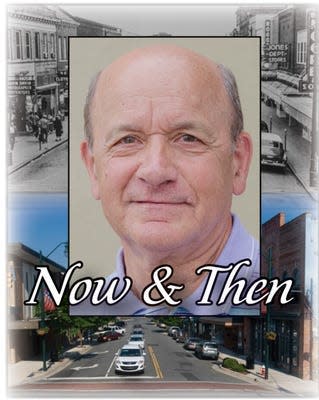Welcome!

Where were you 60 years ago?
I was a teenage linthead.
Not many young people these days can say that. Back in my youth, just about everybody could.
After nearly a year of preparation as a curb hop at Melvin's Drive In, I was ready for the bigtime — working in the cotton mill.
If I had thought entering "public work" at Melvin's was traumatic, I had another think coming. Putting up with dissatisfied food patrons was one thing. Surviving in the harsh reality of a cotton mill was quite another.
I'd spent 16 years in the comfy confines of an average American middle class home with nothing more demanding than mowing lawns, feeding chickens and washing cars. Most of that was done on weekends after I'd slept in so late I was forced to rush to get all my chores done before the powers-that-be came home.
That fateful day when Melvin stopped by to say he had an opening at his drive-in, I thought I'd finally got my wish — to be independent. I soon found out that independence meant being stuck in a parking lot with horns blaring, unhappy diners growling at me and fellow teen patrons delightedly treating me as their personal slave.
After a year of living dangerously in a field of dreamy muscle cars, it was time to get a real job. Randolph Mills seemed to fit the bill.
It was the summer of 1964 and I had a chance to make more money than 50 cents an hour plus tips. Randolph Mills was offering a dollar and a quarter an hour for 40 hours a week, so I could see myself swimming, Uncle Scrooge-like, in my own pool of money.
The Upper Mill in Franklinville took raw cotton and turned it into yarn to be sent to the Lower Mill for spinning and weaving into cloth. Now that was the real workaday world where actual products were made.
The mill was where mature adults worked, not high school kids like myself. They'd surely take me under their wings to impart wisdom — unlike my peers at Melvin’s who tended, in the midst of their own lack of self-confidence, to skewer one another with verbal barbs.
So I arrived at the cotton mill on a Monday morning and was immediately assigned to work with two teenage boys.
So much for entering the adult world of work.
One of our variety of miscellaneous tasks was to take raw cotton bales, pull the material apart in handfuls and spread it out prior to its being sent down a chute to the picker machine. In order to create gray cloth, we mixed two bales of white cotton with one black bale.
We had been instructed to be careful on mixing the whites and blacks carefully so that the ratio would somewhat equal 2-to-1. For a while, we were diligent in our duty.
But soon the temptation to engage in cotton fights was too great for the other two, and I was caught in the middle of a battle that got ugly and wound up in the plant manager's office the next day.
I was brought in by myself, perhaps because the wise old manager knew that my two colleagues were known to have it in for each other and I was just caught in the crossfire. He thanked me for the job I was doing and implied that he would have my back.
But being the go-between in an ongoing teen conflict wasn't my idea of the perfect summer employment. I continued to work at times with one or the other of the teens, not necessarily all three of us together.
One of them turned out to be a historian. He told me that when Gen. Sherman came through our village during the Civil War, he chose not to burn the mill since it was already ancient.
I took his lecture with a grain of salt. After all, only in 1964 could you truly call Randolph Mills ancient.
The unmistakable smell of raw cotton filled my senses that summer, even as the fibers collected in my nose and ears and clung to every inch of my clothes. At quitting time, we all lined up at the air hose to blow off the lint.
Most of the adults in the mill treated me with kindness. One or two of them encouraged me to go to college so I wouldn't have to spend my life in the mill.
I appreciated their concern, but it wasn't necessary to vocalize it to me.
I knew my days as a linthead were numbered.
Larry Penkava is a writer for Randolph Hub. Contact: 336-302-2189, larrypenkava@gmail.com.
